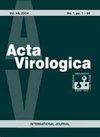Favipiravir and ivermectin show in vitro synergistic antiviral activity against SARS-CoV-2
IF 0.8
4区 医学
Q4 VIROLOGY
引用次数: 0
Abstract
Despite the urgent need for effective antivirals against SARS-CoV-2 to mitigate the catastrophic impact of the COVID-19 pandemic, favipiravir and ivermectin are among the common repurposed drugs that have been provisionally used in some countries. There have been clinical trials with mixed results, and therefore, it is still inconclusive whether they are effective or should be dismissed. It is plausible that the lack of clear-cut clinical benefits was due to the finding of only marginal levels of in vivo antiviral activity. An obvious way to improve the activity of antivirals is to use them in synergistic combinations. The in vitro antiviral activity of the combinations of favipiravir, ivermectin, niclosamide, and chloroquine against SARS-CoV-2 was assessed in Vero E6 cells and the lung epithelial cell, Calu-3. Here we show that favipiravir and ivermectin had synergistic effects against SARS-CoV-2 in Vero E6 cells. In addition, we found that favipiravir had an additive effect with niclosamide, another repurposed anti-parasitic drug with anti-SARS-CoV-2 activity. However, the anti-SARS-CoV-2 activity of favipiravir was drastically reduced when evaluated in Calu-3 cells. This suggested that this cell type might not be able to metabolize favipiravir into its active form and that this deficiency in some cell types may affect the in vivo efficacy of this drug. Favipiravir and ivermectin show the best synergistic effect. This combination is being tested in a randomized controlled clinical trial (NCT05155527).法匹拉韦和伊维菌素对SARS-CoV-2表现出体外协同抗病毒活性
尽管迫切需要针对SARS-CoV-2的有效抗病毒药物,以减轻COVID-19大流行的灾难性影响,但法匹拉韦和伊维菌素是一些国家暂时使用的常见重新用途药物。临床试验的结果好坏参半,因此,它们是否有效或是否应该被驳回仍然没有定论。似乎缺乏明确的临床益处是由于体内抗病毒活性只有边际水平的发现。提高抗病毒药物活性的一个明显方法是将它们协同联合使用。在Vero E6细胞和肺上皮细胞Calu-3中评估了favipiravir、伊维菌素、氯胺酰胺和氯喹联合使用对SARS-CoV-2的体外抗病毒活性。本研究表明,favipiravir和伊维菌素在Vero E6细胞中对SARS-CoV-2具有协同作用。此外,我们发现favipiravir与另一种具有抗sars - cov -2活性的改用途抗寄生虫药物niclosamide具有加性作用。然而,当在Calu-3细胞中进行评估时,favipiravir的抗sars - cov -2活性急剧降低。这表明这种细胞类型可能无法将favipiravir代谢成其活性形式,并且某些细胞类型的这种缺陷可能会影响该药物的体内功效。法匹拉韦与伊维菌素的协同效果最好。该组合正在一项随机对照临床试验(NCT05155527)中进行测试。
本文章由计算机程序翻译,如有差异,请以英文原文为准。
求助全文
约1分钟内获得全文
求助全文
来源期刊

Acta virologica
医学-病毒学
CiteScore
3.10
自引率
11.80%
发文量
43
审稿时长
>12 weeks
期刊介绍:
Acta virologica is an international journal of predominantly molecular and cellular virology. Acta virologica aims to publish papers reporting original results of fundamental and applied research mainly on human, animal and plant viruses at cellular and molecular level. As a matter of tradition, also rickettsiae are included. Areas of interest are virus structure and morphology, molecular biology of virus-cell interactions, molecular genetics of viruses, pathogenesis of viral diseases, viral immunology, vaccines, antiviral drugs and viral diagnostics.
 求助内容:
求助内容: 应助结果提醒方式:
应助结果提醒方式:


